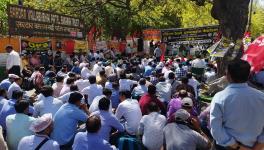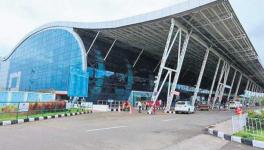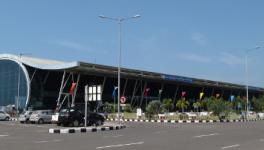Indian and French Unions Wage Similar Battles
Left French Workers and Right Indian Workers
The economic lifeline of France has been completely disrupted for several days now, with workers of all shades from the public and private sector joining hands with teachers, hospital employees, airport workers and air traffic controllers to strike work and march on the streets of major cities including Paris protesting over various issues, ranging from pension reform to airport privatisation.
While flights, train, buses and metro services are virtually closed, hospitals and medical services are severely hit and schools across the country are closed. The police and protesters have also clashed, as strikes and demonstrations hit all major cities and towns including Nantes, Rennes, Montpellier, Strasbourg, Lille, Lyon, Grenoble and Toulouse.
French farmers have also joined the protesters. A fortnight ago, farmers had blocked roads in and around Paris in protest against the government’s agricultural policies, which they say have negatively affected the sector. Farmers in Germany and the Netherlands have also held similar protests in recent months.
The most critical issue, which has united the employees and the working class, is of pension reform, after French President Emmanuel Macron government decided to to allow private participation in the pension funds. Unions representing millions of staff in the public and private sector are unhappy over this overhaul, which they say will force people to work longer hours or face reduced payouts when they retire.
The prevailing French scheme calculates pension benefits largely on the basis of employee’s 25 highest-paid years of work in the private sector, or in the public sector, based on payments in the last six months before an employee retires. This is currently applies to France’s current system of 42 different pension schemes across government and private jobs, with variations in retirement age and benefits.
The Macron government wants to create a unified pension system and has indicated that it will allow private participation in managing the huge pension funds. Reports quoting the striking French union leaders say that the move towards a universal points-based pension system would remove the most advantageous pensions for a number of jobs ranging from sailors to lawyers and even opera workers.
A recent poll published by French media concludes that 75% of people consider pension reform necessary, but only a third believe that Macron’s government will deliver on them—the reason is the hints about private sector role in managing the funds.
The French pension issue is similar to the case in India, where just last week a massive demonstration was held by retired employees and pensioners at Delhi’s Jantar Mantar to demand a higher post-retirement payout, linked to their income during their last few months before retirement. This is how pensions were calculated in India before 1995.
The protesters have already moved the Supreme Court, which is considering the matter. In reply to a question in the Rajya Sabha on 19 November, on whether there are plans to raise the minimum pension under the Employees’ Pension Scheme or EPS, the Minister of State for Finance replied that there were not. To whether the government planned to increase its contribution to the scheme, the Minister said, again, “No, sir.”
Another important issue in France is the Macron government’s plan to privatise major airports. A petition calling for a referendum on the possible privatisation of French airports operator, ADP, has attracted more than one million signatures. The signatories want to force a national referendum on this issue, and though their numbers are still far off the threshold needed to trigger a vote, they have been able to pile pressure on the government.
Under French law, ADP’s privatisation could be blocked if 10% of registered French voters, or 4.7 million people, sign the petition by March next year, which is still a long way off.
Macron had started a wave of state sell-offs since his first days in office in 2017 and ADP’s privatisation is part of this plan. The government plans to sell all or part of its 50.6% stake in ADP—worth around 8.8 billion euros ($9.7 billion) at current market prices. The ADP group operates Paris’ Charles de Gaulle and Orly airports.
The plan to relinquish state ownership has fueled criticism even from politicians, who charge the government with selling off valuable and strategic national assets. Opposition to ADP’s privatisation was one of the rallying cries of the recent protests, including the earlier Yellow Vest demonstrations which had begun as a backlash against the high cost of living.
Drawing an exact parallel, airport employees across India have been carrying out protest demonstrations against the Bharatiya Janata Party-led National Democratic Alliance or NDA government’s decision to hand over airports run by public sector Airports Authority of India (AAI)—especially the profitable ones—to the private sector.
The protests intensified after 1 December this year when the AAI recommended that the Centre privatise the airports at Amritsar, Varanasi, Bhubaneswar, Indore, Raipur and Trichy. The recommendation came months after the BJP-led government privatised six airports at Lucknow, Ahmedabad, Jaipur, Mangaluru, Thiruvananthapuram and Guwahati in February, under the public-private partnership or PPP model, where private parties are awarded contracts to operate, manage and develop airports.
At a meeting on 5 September, the AAI board decided to privatise six more airports at Amritsar, Varanasi, Bhubaneswar, Indore, Raipur and Trichy. The AAI works under the Ministry of Civil Aviation and owns and manages more than 100 airports. In February, in the first round of airport privatisation, Gujarat-based Adani Group bagged the contract for all six by winning the bids with huge margins. On 3 July, the Union Cabinet approved the leasing out of Ahmedabad, Lucknow and Mangaluru airports to the Adani Group. The cabinet is yet to approve the leasing of the other three airports.
AAI workers have been up in arms over the privatisation spree, saying such moves would make the state-run mini-Ratna profit-making enterprise into a loss-making one. They say the government would turn the AAI into a landlord who just leases out its valuable properties and gets a rent out of the lease, for four decades or more.
The spate of militant protests in France, which have been going on in phases for almost five weeks, are open-ended and would continue in coming days. Such protests are also being witnessed in India. The issues are quite similar.
Trade unions in India should draw lessons from the protests in France and several other countries, especially in Latin America, and vice versa, to take their demands to the logical conclusion.
The writer was Deputy Executive Editor of news agency, Press Trust of India, and has extensively covered civil aviation and defence. The views are personal.
Get the latest reports & analysis with people's perspective on Protests, movements & deep analytical videos, discussions of the current affairs in your Telegram app. Subscribe to NewsClick's Telegram channel & get Real-Time updates on stories, as they get published on our website.
























